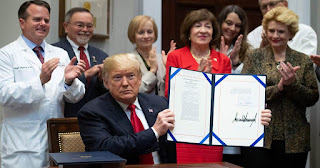In healthcare the relationship between patients and their pharmacists is extremely important, similar to the one that exists between patients and their physicians. Thanks to bipartisan legislation that was signed into law late last year the patient-pharmacist relationship is even stronger. Gone are the ridiculous pharmacy “gag orders” that prohibited pharmacists from sharing with patients that they could save money by paying cash for prescription medications rather than using their health plan.
According to Kaiser Health News, both bills — one for Medicare and Medicare Advantage beneficiaries (S.2553) and another for commercial employer-based and individual policies (S.2554) — passed Congress with little dissent. The legislation was endorsed by the National Community Pharmacists Association (NCPA), American Medical Association, Alliance for Transparent and Affordable Prescriptions, ERISA Industry Committee, Pharmaceutical Care Management Association, and America’s Health Insurance Plans (Jaffe, 2018). Most patient advocacy groups also supported the effort to lift the gag orders.
 |
| Photo Source: NBC News | Saul Loeb / AFP - Getty Images |
"As a pharmacist for more than 30 years, I can say firsthand that I was prohibited many times from telling my patients that there was a cheaper option available to them because of a gag clause," Rep. Carter said in a statement upon introducing . "Pharmacists must be able to tell patients what is in their best interest and this legislation works to make that happen. Patients need and deserve the most affordable options" (Carter, 2018).
In recent years, states had already started to remove such restrictions. According to a detailed report by the National Conference of State Legislatures, between 2016 and 2018, at least 30 states enacted laws among at least 41 state legislatures that considered prohibiting “gag clauses” in contracts that restrict pharmacists (Cauchi, 2018). It has long been said that the states are the laboratories of democracy, and on this issue they proved to be right.
 |
| Photo Source: NCSL |
References:
- Jaffe, Susan. (2018, October 10). No More Secrets: Congress Bans Pharmacist ‘Gag Orders’ On Drug Prices. Kaiser Health News. Retrieved online at https://khn.org/news/no-more-secrets-congress-bans-pharmacist-gag-orders-on-drug-prices/?utm_campaign=KHN%3A%20First%20Edition&utm_source=hs_email&utm_medium=email&utm_content=66566195&_hsenc=p2ANqtz--TqonAHxTESNQLYvXrCzV6Ta8RGY5mfzWX_3y0oo0TU3fXvMVOKEwAW2Y8tHO40ySyz20WKvEq8f0aKBzucUIfu36OJQ&_hsmi=66566195.
- Carter, Earl L. (2018, September 7). Carter Introduces Measure to Prohibit "Gag Clause" Provisions. The Honorable Earl "Buddy" L. Carter. Retrieved online at https://buddycarter.house.gov/news/documentsingle.aspx?DocumentID=3529.
- Cauchi, Richard. (2018, December 1). Prohibiting PBM “Gag Clauses” that Restrict Pharmacists from Disclosing Price Options: Recent State Legislation 2016-2018. National Conference of State Legislatures. Retrieved online at http://www.ncsl.org/Portals/1/Documents/Health/Pharmacist_Gag_clauses-2018-14523.pdf.

No comments:
Post a Comment